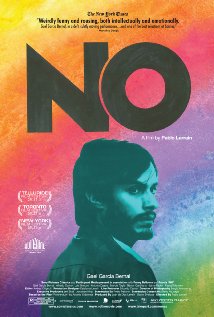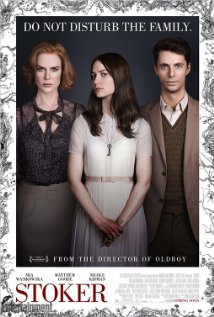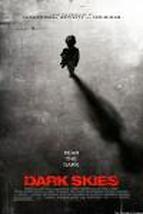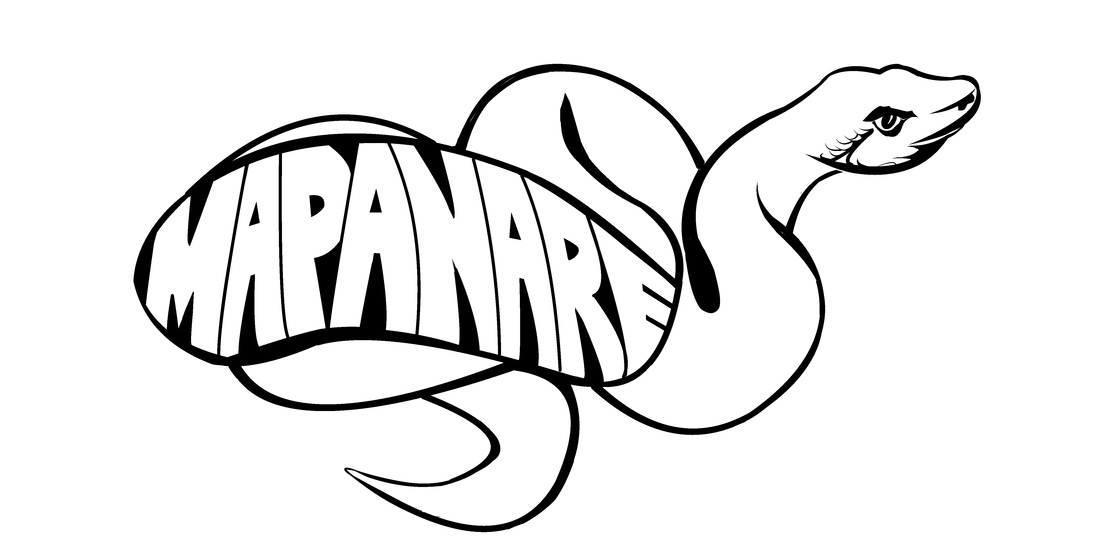
It is an interesting angle. Pinochet, no doubt, sought the "yes" or "no" vote to legitimize his ten year dictatorship. As an egomaniac he likely felt certain of a victory and also could point to economic progress in the country. He hoped the cowed population, many of whom were possibly better off than they had been, would either not vote or vote for him.
And if all else failed perhaps he could just steal the election.
All of this is background for a film that deals almost entirely with the construction of the opposing "commercials" for the "yes" and "no" side. Each side was to get 15 minutes a day for a month.
One of the interesting things about the film is that there are numerous characters and maybe two or three are even given a chance to develop.
Gael Garcia Bernal (Amores Perros, Y Tu Mama Tambien, Motorcycle Diaries) plays René Saavedra, an advertising expert recently returned from exile (presumably for his or his family's leftist leanings). He works for Lucho Guzmán, who is from the other side of the political fence. In the first scene a pitch to a client is interrupted by a visit from a "communist." Of course anyone with a whiff of skepticism over the Pinochet regime be they Christian Democrat, socialist or actual communist might find the term hung around their neck.
The meeting leads to Saavedra working on the campaign for the "No" side. The government hires an Argentine (for SHAME!) to do their production. It is insinuated later that no creative types in Chile would get on board with "yes."
Guzmán, played by Alfredo Castro in an excellent performance, alternates between helping his young protégé and threatening him. The interplay between the two may be the best part of the movie. When he intimates to a government minister that the opposition producers need to have their danger brought home he is cautioned that is a door that, once opened, cannot be closed. Nonetheless, later, he says, basically; we need to fuck them up.
The word "fuck" is basically the reason for the R rating. No reason a young adult cannot see this movie-- aside from an addiction to CGI.
The film mixes archival footage in with the new footage--and this is done seamlessly. Its rough sketch of the history will leave the curious, those unfamiliar with the period, heading to the history books. But the story the film is trying to convene is told in full. This isn't about the 1973 coup. The film also has a rough look to it but this enhances rather than detracts in this case. Not everything has to be Life of Pi.
In one brief scene in the film Savaadra and Guzmán discuss which side the Americans are on. Both insist they are on theirs. The curious thing is that in 1973 the USA was certainly on Pinochet's side. Everyone knows the USA didn't just support the coup but was complicit in it. But the notion that the USA was still in the dictator's corner in 1988 is wrong. The USA is no different from any other country. Who we support depends on perceived self-interest (ask Saddam Hussein).
This illustrates all the small bits of subtext that seem to float through this film. If it all sounds sort of dour and serious? That is not how this is presented at all. The film is full of sly humor and clever repartee. In that respect it is like the "No" commercials; it takes something serious and narrows it down to a single aspect. That aspect is then explored in a broad wash.
At the conclusion, in brief sequences, we see how Chile moved past this dark spot in its history but it is again done subtly. A scene from one of the commercial bits shows police in riot gear beating a man with a voice over singling out the victim and one police man. The voice says that each man wants peace, each man is Chilean and that no Chilean should fear another.
Sort of goes for all of us, everywhere, regardless of nationality.





 RSS Feed
RSS Feed